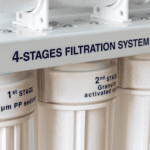The lifespan of resin beads in a water softener is a topic of interest to homeowners seeking an efficient and long-lasting solution for their hard water problems. In this article, we will provide a comprehensive analysis of how long resin beads can last, factors that influence their lifespan, and ways to maintain their effectiveness.
What Are Resin Beads And Their Purpose?
Resin beads are tiny, spherical substances found in the tank of a water softener. They are primarily composed of polystyrene and are charged with sodium ions. The purpose of these resin beads is to transform hard water into soft water.
Hard water contains high levels of minerals like calcium and magnesium. When this water passes through the resin bed in the water softener, an ion exchange process takes place. The resin beads attract and hold onto the calcium and magnesium ions, replacing them with sodium ions. This exchange softens the water, reducing scale build-up and improving soap lather, among other benefits.
How Long Do Resin Beads Last?
Under ideal conditions, resin beads in a water softener can last up to 20 to 25 years. However, this lifespan can vary significantly based on several factors, which we will delve into shortly.
For reference, here’s a general estimate of resin bead lifespan:
| Condition | Lifespan |
|---|---|
| Ideal Conditions | 20-25 years |
| Average Conditions | 10-15 years |
| Poor Conditions | 5-10 years |
It’s important to remember that these are just estimates. Many variables can impact the effective lifespan of resin beads.

Factors That Influence The Lifespan Of Resin Beads
A variety of factors can influence how long resin beads last in a water softener:
- Water Hardness: Harder water requires the resin beads to work more intensely to soften the water, which can accelerate bead degradation.
- Water Usage: Higher water usage can lead to more frequent regeneration cycles, which might shorten the lifespan of the resin beads.
- Maintenance: Proper maintenance and cleaning of your water softener can prolong the life of your resin beads.
- Quality of Resin Beads: Higher quality resin beads typically last longer than lower quality ones.
- Iron and Chlorine Levels: High levels of iron and chlorine in the water can cause the resin beads to degrade faster.
Maintaining Resin Beads For Optimal Lifespan
There are several ways to prolong the lifespan of resin beads:
- Regular Regeneration: Set your water softener to regenerate based on your household’s water usage and hardness level. This helps to keep the resin beads functional.
- Use Resin Cleaners: Regularly use resin cleaners to remove any iron, silt, or organic compounds that may be deposited on the resin beads.
- Quality of Resin: When replacing resin beads, opt for high-quality beads. They may be more expensive, but they will likely last longer.
When To Replace The Resin Beads
Knowing when to replace the resin beads is crucial for the optimal functioning of your water softener. Here are some signs that it might be time for a replacement:
- Decreased Water Softness: If your water starts to feel harder, it might indicate that the resin beads are losing their effectiveness.
- Inefficient Soap Lathering: If soap and shampoo don’t lather as well as they used to, your resin beads may need replacement.
- Increased Scale Build-Up: Noticeable scale build-up on appliances and fixtures might be a sign of exhausted resin beads.
Remember that these signs might also indicate other issues with your water softener, so it’s important to get a professional evaluation.
How To Replace Resin Beads
Replacing resin beads is a fairly complex process. While you can do it yourself if you’re comfortable with basic plumbing, hiring a professional is often a safer choice. Here’s a brief overview of the steps involved:
- Shut Off The System: First, shut off the water supply and power to the water softener.
- Drain The Tank: Next, relieve the pressure and drain the water from the system.
- Remove Old Resin: After that, remove the top of the tank and take out the old resin.
- Add New Resin: Then, add the new resin beads following the manufacturer’s instructions.
- Reassemble The System: Finally, reassemble the system and restore the water and power supply.
Cost Of Replacing Resin Beads
The cost of replacing resin beads can vary based on several factors:
- Size of the Tank: Larger tanks will require more resin beads, increasing the cost.
- Type of Resin: Different types of resin come at different prices. High-quality, durable resin tends to be more expensive.
- Labor Costs: If you hire a professional for the job, labor costs will be an additional expense.
On average, you can expect to pay between $100 to $300 for the resin, and between $150 to $600 for professional installation.
Preventive Measures To Prolong Resin Beads Lifespan
There are preventive measures you can take to maximize the lifespan of your resin beads:
- Install a Pre-Filter: A sediment pre-filter can protect your water softener from large particles that can damage the resin beads.
- Use Iron and Chlorine Filters: If your water has high levels of iron or chlorine, consider installing filters to remove these elements before they reach the softener.
- Test Water Regularly: Regular water testing can help you adjust your water softener settings and maintenance practices as needed.
By implementing these measures, you can extend the lifespan of your resin beads and ensure the effective operation of your water softener.

Conclusion
Understanding the lifespan of resin beads in your water softener and the factors that influence it can help ensure your system operates effectively for as long as possible. While resin beads can last up to 25 years under ideal conditions, regular maintenance, water quality, and usage patterns are crucial considerations. By taking proper care of your water softener, you can enjoy softened water and extend the lifespan of the resin beads, providing long-term efficiency and cost-effectiveness.
Frequently Asked Questions
What are resin beads in a water softener?
Resin beads are tiny, spherical substances found inside the tank of a water softener. They are primarily composed of polystyrene and are charged with sodium ions. The primary purpose of these beads is to attract and hold onto the calcium and magnesium ions in hard water, replacing them with sodium ions. This ion exchange process softens the water.
How long do resin beads last in a water softener?
Under ideal conditions, resin beads in a water softener can last up to 20 to 25 years. However, their lifespan can vary based on factors such as water hardness, water usage, maintenance practices, the quality of the beads, and the levels of iron and chlorine in the water.
How do I know when to replace the resin beads?
Indications that it might be time to replace your resin beads include decreased water softness, inefficient soap lathering, and increased scale build-up on appliances and fixtures. If you notice these signs, it’s wise to consult a professional for a thorough evaluation.
How much does it cost to replace resin beads?
The cost of replacing resin beads can range from $100 to $300 for the resin itself, depending on the size of the tank and the type of resin. If you opt for professional installation, labor costs can range from $150 to $600.
What can I do to prolong the lifespan of resin beads?
Regular regeneration, using resin cleaners, and opting for high-quality resin can help prolong the lifespan of your beads. Additionally, installing a pre-filter, using iron and chlorine filters if your water has high levels of these elements, and conducting regular water testing can contribute to a longer lifespan for your resin beads.









